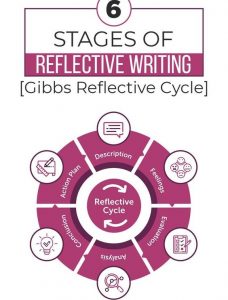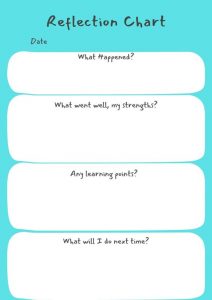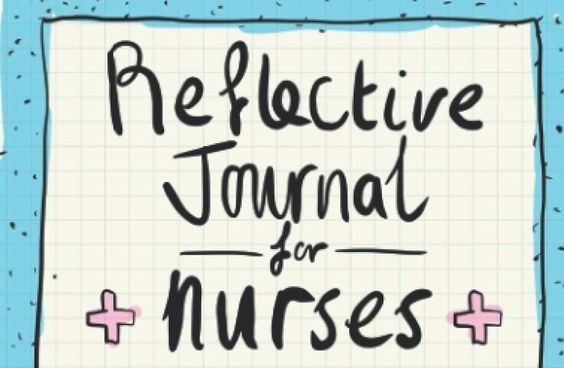The nursing profession is a demanding one, requiring not only technical expertise but also a deep understanding of human experiences and the ability to adapt to ever-changing situations. A nursing reflective journal is a powerful tool that can help you cultivate this crucial understanding and enhance your professional growth. By regularly reflecting on your experiences, you can identify patterns, uncover hidden biases, and develop a more empathetic and insightful approach to patient care. But how can you ensure that your nursing reflective journal is truly valuable and impactful?
Here are some tips to help you write a nursing reflective journal that will unlock your potential as a nurse:
Step-By-Step Guide tp Writing a Compelling Nursing Reflective Journal
- Embrace the Purpose: It’s Not Just a Diary
Before you begin writing, it’s essential to understand the true purpose of a nursing reflective journal. It’s not simply a place to vent about a tough shift or jot down notes about a particularly interesting case. It’s a tool for purposeful reflection, a space where you can analyze your actions, examine your thoughts and feelings, and ultimately learn and grow from your experiences.
Think of it as a conversation with yourself – a structured dialogue where you explore the complexities of patient care and examine your own role in it.
- Set the Stage: Structure and Format
The beauty of a nursing reflective journal lies in its flexibility. You can choose a format that best suits your needs and writing style. Some prefer a traditional journal with handwritten entries, while others find digital tools or structured templates more appealing.
Regardless of your chosen format, consider incorporating the following elements:
- Date and Time: This helps establish context and allows you to track your development over time.
- Patient Information (De-identified): Briefly describe the patient, their situation, and relevant medical history. Be mindful of confidentiality and use initials or pseudonyms to protect patient privacy.
- Event Description: Describe the specific event or situation that you want to reflect on. Be detailed and use descriptive language to paint a vivid picture of the experience.
- Feelings and Thoughts: Don’t shy away from exploring your emotions. What were you feeling during the event? What thoughts ran through your mind? Be honest and open with yourself.
- Analysis and Learning: This is the heart of the reflective process. Analyze the event critically. What went well? What could have been done differently? What did you learn from this experience?
- Action Plan: What steps can you take to improve your practice based on your reflections?
- Focus on the Right Elements:
When choosing what to write about in your nursing reflective journal, prioritize experiences that were particularly impactful, challenging, or thought-provoking. Don’t feel obligated to write about every shift or every interaction.
Here are some specific areas to focus on:
- Difficult Patient Interactions: Reflect on challenging encounters with patients, their families, or colleagues. Analyze how you handled the situation, and identify areas for improvement in your communication and interpersonal skills.
- Ethical Dilemmas: Nursing is often filled with ethical dilemmas. When faced with a difficult decision, take the time to document your thought process, explore different perspectives, and reflect on the chosen course of action. This will help you develop a stronger ethical compass.
- Personal Growth: Don’t just focus on patient care. Reflect on your own professional development and personal growth as a nurse. What new skills have you acquired? What areas are you striving to improve in?
- Clinical Skills: Consider the clinical skills you use every day. Reflect on any challenges you encountered, any areas where you felt proficient, and any new techniques you learned.
- Teamwork Dynamics: Reflect on your interactions with colleagues, supervisors, and other healthcare professionals. Analyze successful team collaborations, identify any communication breakdowns, and consider ways to improve teamwork in the future.
- Self-Reflection: Don’t neglect introspection. Reflect on your own biases, assumptions, and personal beliefs. How do these factors influence your approach to patient care? How can you become more aware of your own limitations and strive for greater objectivity?
- Cultivate the Right Mindset:
Your nursing reflective journal is a safe space for honest self-assessment and exploration. Don’t be afraid to acknowledge your mistakes or vulnerabilities.

Here are some tips for cultivating the right mindset:
- Embrace Vulnerability: Be honest with yourself. Don’t be afraid to admit when you made a mistake or when you felt overwhelmed. Vulnerability is a sign of strength, not weakness.
- Challenge Your Assumptions: Reflecting on your experiences allows you to challenge your own beliefs and assumptions. Question your own biases and strive for greater objectivity in your care.
- Seek Continuous Improvement: The goal of nursing reflective journaling is not to dwell on past mistakes but to learn from them and strive for continuous improvement.
- Use First-Person Perspective: Write from your own perspective. Use “I” statements to express your thoughts and feelings openly and honestly.
- Be Kind to Yourself: Don’t be too hard on yourself. Everyone makes mistakes. The important thing is to learn from them and move forward.
- Make it a Habit: Regular Reflection is Key
The most effective nursing reflective journals are those that are kept consistently. Aim to write regularly, even if it’s just for a few minutes each day or after every shift.
- Set Reminders: Use calendar reminders or alarms to prompt yourself to write.
- Find a Dedicated Space: Create a quiet space where you can reflect without distractions.
- Carry a Journal: Keep a small notebook or journal with you so you can jot down ideas or observations whenever inspiration strikes.
- Don’t Just Write, But Reflect:
Writing is only half the battle. After you’ve recorded your experiences, take the time to truly reflect on them.
- Ask yourself questions: What did you learn from this event? What could you have done differently? What are your strengths and weaknesses in this area?
- Connect with Others: Share your reflections with trusted colleagues, mentors, or supervisors. Engaging in dialogue with others can provide valuable insights and perspectives.
- Review Past Entries: Periodically review your past entries to track your progress and identify patterns in your experiences.
- Share Your Insights:
While your nursing reflective journal is a personal tool, you can also use it to share valuable insights with others.
- Contribute to Case Studies: If you encounter a particularly interesting or challenging case, consider writing a case study for publication or presentation.
- Share with Students: If you are a mentor or instructor, use your journal entries to provide real-world examples to students.
- Present at Conferences: If you have developed a strong body of reflection, consider presenting your insights at a nursing conference.
- Use Your Reflections for Professional Development:
Your nursing reflective journal is a powerful tool for professional growth. Use your reflections to:
- Identify Areas for Improvement: Use your journal entries to identify areas where you need to develop new skills or improve existing ones.
- Set Goals: Use your reflections to set personal and professional goals for your development as a nurse.
- Develop Your Nursing Philosophy: As you reflect on your experiences, you will develop a deeper understanding of your own values and beliefs about nursing care.
- Advocate for Change: Your reflections can inform your advocacy for positive change in your workplace or within the larger nursing community.
- Remember, It’s a Journey:
Reflecting on your experiences as a nurse is an ongoing journey. Don’t expect to achieve perfection overnight.
- Be patient with yourself: It takes time to develop the habit of reflective journaling and to fully embrace its benefits.
- Celebrate your progress: Acknowledge your growth and celebrate your accomplishments, both big and small.
- Embrace the process: Reflective journaling is not a destination, but a journey of self-discovery and professional development

The Benefits of a Stellar Nursing Reflective Journal
The benefits of a consistent and thoughtful nursing reflective journal are numerous and far-reaching:
- Enhanced Patient Care: By analyzing your experiences, you can identify patterns, refine your approach to patient care, and ultimately provide better outcomes.
- Improved Communication: Reflecting on your interactions with patients, families, and colleagues can help you develop stronger communication skills.
- Increased Confidence: As you gain a deeper understanding of your strengths and weaknesses, you will build greater confidence in your abilities.
- Greater Empathy: Reflective journaling helps you connect with your patients on a deeper level, fostering empathy and understanding.
- Professional Development: Your reflections can guide your professional development and help you achieve your career goals.
- Reduced Stress: The act of writing can be therapeutic, allowing you to process difficult experiences and reduce stress.
A nursing reflective journal is a powerful tool that can unlock your potential as a nurse. By embracing the purpose, cultivating the right mindset, and making it a habit, you can create a journal that is truly impactful and transformative. Remember, it’s a journey, not a destination. Be patient with yourself, celebrate your progress, and use your reflections to become the best nurse you can be.
Get Customized Help with Writing a Nursing Reflective Journal
In case you are looking for help with writing a nursing reflective journal, simply engage Academia Scholars. We offer professional essay writing services for undergraduate, Degree, Master’s and Doctoral nursing courses. Apart from the nursing reflective journal, we can also provide customized assistance with writing nursing research papers, case studies and dissertations.



 Hi, how can I help?
Hi, how can I help?